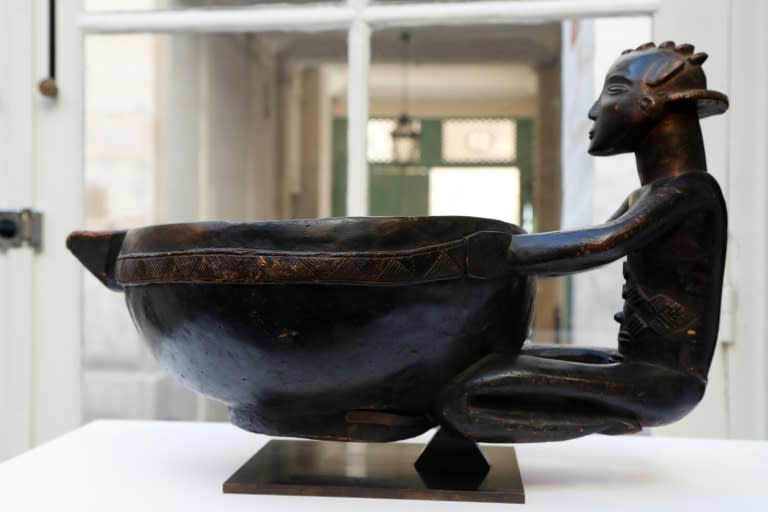Dealers bristle as calls grow for restitution of colonial-era art
Among the specialists in indigenous art gathering for their annual trade show in Paris this week, resistance is growing to demands that works taken from native peoples be returned decades or even centuries after the fact. President Emmanuel Macron gave the restitution push new momentum last year when he pledged to look into returning cultural treasures to African nations, raising the prospect that museums across Europe will be pressured to do the same. "Africa's heritage cannot just be in European private collections and museums," Macron said in Burkina Faso. But dealers and experts attending the Parcours du Monde showings at galleries in the chic Saint-Germain neighbourhood this week accuse him of opening a "Pandora's box" with a promise that will prove difficult to keep. "Restitution means returning what was taken. That implies an illegitimate possessor on one side and a robbed owner on the other, which is not the case," said Yves-Bernard Debie, a Belgian lawyer specialising in art markets. With regular appearances on TV and in newspapers, Debie has been one of the most vocal opponents to returning works taken by soldiers, explorers and others during the colonial era. "Thank goodness we have him," said one prominent French art expert, who asked for anonymity given the risks for going against what has become considered "politically correct". Such views were echoed by Julien Volper, a curator at the Royal Museum for Central Africa in Tervuren, Belgium. "If you're against restitutions, you're tarred with racism or neo-colonialism. Most people don't want such a label, especially when it's not at all the case," Volper said. "Yes there was plundering, but so what? Objects were plundered in Europe as well," he said, adding that he speaking in a personal capacity and not on behalf of his museum. - Emptying museums? - Hundreds of thousands of objects from Africa, the Americas, Asia and Oceania are housed in Western museums or maintained by wealthy collectors around the world. While the controversy over their ownership is nothing new, the issue was thrust into the spotlight in 2016 when President Patrice Talon of Benin demanded that France return items including carvings, sceptres and sacred doors from the Palaces of Abomey, formerly the capital of the kingdom of Dahomey. The objects, many of which are part of the vast collection of indigenous art at Paris' Quai Branly museum, were seized by French troops between 1892 and 1894. The request was rejected, as is often the case by governments saying state property cannot be seized or given away in any circumstances. Under French law in particular, museums are forbidden from permanently parting ways with any piece in their collections. Opponents also say many African nations lack the resources and expertise to properly conserve the works, citing in particular the risk of their destruction at the hands of Islamic extremists -- a suggestion that infuriates African officials. Yet Macron's pledge has raised hopes in Benin that the works might one day be brought home. Critics warn that the move could eventually empty museums around the world which have been conserving and restoring the works for decades. "Every country will have the right to reclaim their due: the friezes from the Parthenon, the Mona Lisa, the Pergamon altar," French gallery owner Judith Schoffel de Fabry wrote in a recent trade journal. Calling Macron's pledge a "Pandora's box", she said the president might also prompt French collectors to move their works out of the country for fear of seizure. - 'Not plunderers' - "Neither Africans nor anyone else wants to see museums emptied of their works," countered Didier Claes, a Belgian gallery owner whose mother was Congolese. "But European museums are full" even as "Africa has been cut off from its heritage," he said. "We have to at least accept to discuss" restitutions. Regarding Benin, "we have to discuss the matter," agreed Alain Lecomte, an expert in tribal arts in Paris. "The objects being sought are exceptional, the treasures of chiefs," he said, but collectors who acquire such works, often saving them from likely destruction, "are not plunderers". Yet even Claes acknowledges that such a prospect has unsettled collectors and dealers worried that longstanding legal guarantees may be in doubt. If no legal workarounds are found, he suggested alternatives for returning works such as "loans, gifts or exchanges." "And why not build a wing of the Quai Branly museum in Cotonou?" he suggested, referring to Benin's largest city. France has already set an example -- albeit a rare one -- of how to get around the rules to return artefacts. In 2010 it gave South Korea back long-sought royal manuscripts, via an "indefinite" loan. For Debie, however, this was a "legal trick" that few collectors would be willing to repeat. South Korea "considers this a restitution: France will never get back this indefinite loan," he said.



